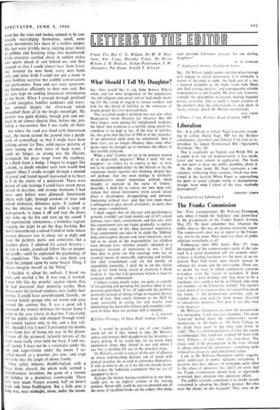Itnr
E.P5 VC) 711.1 ilrf02
From: The Rev C. G. Wilson, Dr W. B. Hep- burn, Alec Craig. Dorothy Usher, Dr Bryan Wilson. J. H. Dodson, Arthur Pottersman, S. W. Alexander, Pat Sloan, Arnold T. Schwab.
What Should I Tell My Daughter?
SIR,—One would like to ask John Rowan Wilson when, and for what proportion of the population.
'the old religious and social taboos' had much mean- ing for the young in regard to sexual conduct and how far the. threat of hell-fire or the ostracism of decent people has ever deterred them.
This so-called modern problem was not new when Shakespeare wrote Measure for Measure. But still
there lingers, even among the 'enlightened' moderns, the belief that eroticism is a terrible thing which has somehow to be kept at bay. If the fear of hell-fire, etc., has gone then the fear of VD or of the 'nuisance' of an unwanted child must be substituted. And if these fears are no longer effective, then some other device must be thought up to minimise the effects of this terrible eroticism.
What a pity! Cannot we try to be positive instead of so desperately negative? What I shall 'tell my daughter'—or rather try to convey to her—is, first, not to be stampeded either by the liberals or by the censorious moral rigorists into thinking, despite her- self perhaps, that one must indulge in (probably unsatisfactory) sexual experience without much thought or restraint in the name of 'liberty.'
Secondly. I shall try to convey my own deep con- viction that sexual intercourse (even casual sexual play) is meaningless, disappointing and seriously frustrating without love—and that love must mean a willingness to give oneself absolutely; in short, that love means commitment.
I shalt suggest that on physical and psychological grounds (couldn't we keep morals out of it?) sexual intimacy must imply commitment, and that only with this commitment can one begin, gradually, to explore the infinite range of this deep personal experience.
True commitment can take in its stride the 'fiddling' with contraceptive devices and, more important, never fail to be aware of the responsibility for children born through love—whether actually intended at a particular moment of intercourse or not. I shall then dare to point out that marriage vows are an essential means of outwardly expressing and sealing this vital commitment—and are not merely an expendable formality. I shall try to let her realise that so far from being afraid of eroticism I thank God for it—but that I do genuinely believe it must be eroticism with commitment.
I believe young people today are quite as capable of recognising and pursuing this positive ideal as any previous generation. If we all approach the problem
positively instead of taking refuge in negative devices born of fear, then surely between us we shall be
mere successful in caring for and maybe even• diminishing the inevitable failures and casualties, who even in these days are perhaps still a minority.
C. G. WILSON Si John's Vicarage, 14 Dane Bank Avenue, Crewe


































 Previous page
Previous page